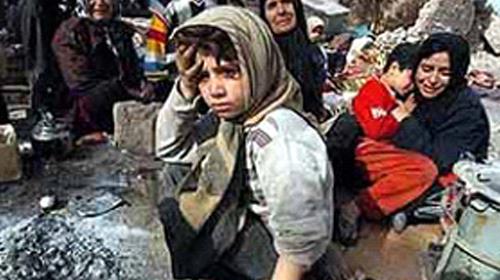Iran, Jan. 6, 2018 — Iranian regime’s deputy Labor Minister had said that there are two million hungry people in the country, a really shocking figure, says a regime’s MP.
Member of regime’s parliament Social Affairs Committee believes that with these many people suffering from hunger, the total number of the country’s deprived should be much higher.

Lack of food leads to malnutrition amongst the most vulnerable, the children, and eventually increases the disease and illness amongst the population
State-run IRNA news agency has reported on a meeting titled ‘The 2018 Budget: will it increase or reduce poverty?’, in which regime’s deputy Labor and Social Welfare Minister, Ahmad
Earlier, Ahmad
Meanwhile, Masoud Rezaei, deputy chair of regime parliament’s Social Affairs Committee, doubts Maydari’s figure, saying that if the number of hungry people
”  “>
“>
Poverty hits Iranians
Criticizing the regime’s Statistics Center, Rezaei says in his interview with state-run Etemad-Online website “before anything else, our main problem is how to define these terms and indicators, meaning we don’t exactly know what it means to be jobless and this is the reason behind different figures.”
Pointing out that the same problem is also true with regard to the issue of hunger, deputy chair of regime parliament’s Social Affairs Committee then asks “who is hungry? The ones who can’t afford their daily meals or the ones whose monthly salary is not enough to meet their basic needs?”
Masoud Rezaei then points out that “if it’s true that two million Iranians can’t afford their daily meals, then it would be too shocking. Besides, if we add to this figure the number of people whose earning is not enough for covering their basic needs, then we will be faced with a huge ‘deprived’ population.”
Regime’s responsibility towards hungry people
Members of regime parliament’s Social Affairs Committee acknowledged that “we could say that not only a specific body or ministry, rather the entire regime is responsible for this. When faced with such a phenomenon, we have to put the blame on the entire system.”
Many residents of marginal urban areas, where the unemployment rate is higher than the country’s average, are among the society’s poorest population. Tasnim news agency, affiliated to the terrorist Quds force quotes Anushirvan Mohseni, the head of regime’s Welfare Organization as saying “12-13 million Iranians live in marginal urban areas.”
Earlier, regime’s Minister of Roads and Urban Development had said on December 23 that there are 19 million Iranians who live in poor neighborhoods, meaning the places where they live, lack the least amenities and safety standards.
Iran’s widespread protests started on December 28, 2017, in Mashhad. The protests at the beginning were aimed at the rising cost of living, but it quickly targeted the entire regime.
Experts believe that although Iranians suffer serious economic problems and the high unemployment rate, the protesters have mainly focused on indiscrimination, injustice, rendering, and economic corruption.
Mrs. Maryam Rajavi, the president-elect of the Iranian Resistance, said on February 8, 2015, in Paris, “Iranian households suffer from hunger due to poverty and destitution. Twelve million sleep hungry each night.” She also said that “If the Mullahs ignore the economic implosion, it would lead to the eruption of popular protests.”








